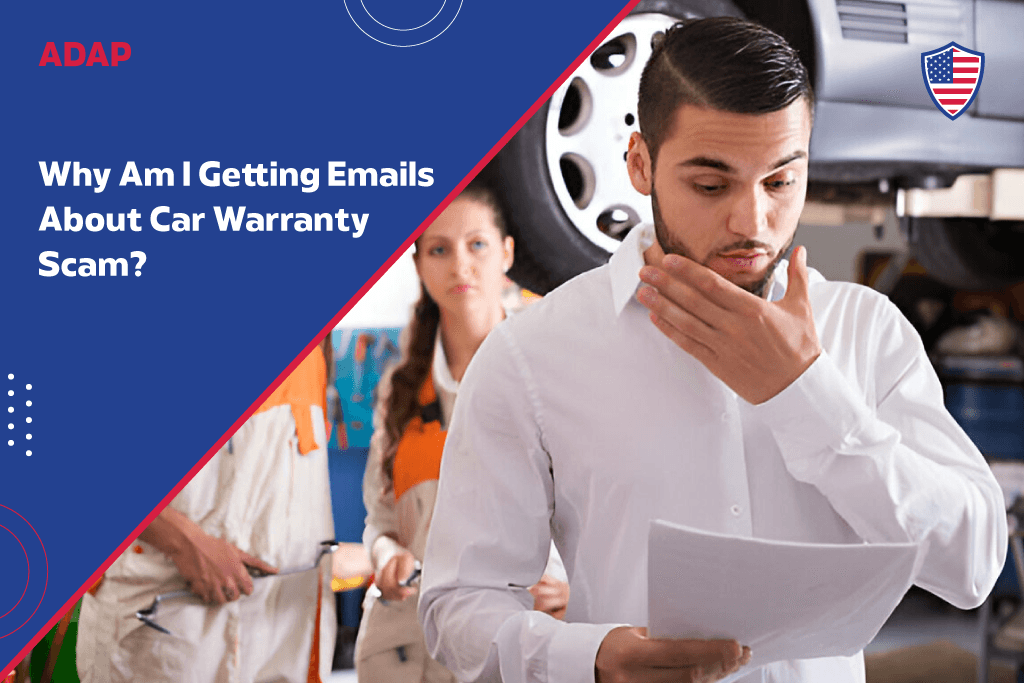
May 1, 2024
Why Am I Getting Emails About Car Warranty Scams?
Learn to spot and avoid car warranty scams with our expert guide. Find red flags and tips to protect yourself from online fraudsters.
As a car writer with five years of experience, I've been helping people understand car stuff and how to protect themselves. Today, I want to talk about those annoying emails you might be getting about car warranty scams.
So, why are these emails showing up in your inbox? Well, it's because some bad guys online are trying to trick you. They pretend to be legit car companies or insurance folks to get you to fall for their scams.
If you get caught up in one of these scams, it could mean losing money for warranties you don't need or even having your identity stolen. That's why it's super important to know what to look out for and how to stay safe online.
Understanding Car Warranty Scams:
Car warranty scams are tricks where dishonest people try to fool car owners into buying warranties they don't need or that aren't even real. They do this by using sneaky methods to make their emails seem real.
These scammers get your personal info from different places, like when there's a big data breach, from public records, or by buying lists of people's info from other shady sources. Then, they use this info to send you emails that look legit.
In these scam emails, they often try to make you feel like you have to act fast by saying your warranty is about to run out or that you'll get in trouble if you don't do what they say. They might even threaten you with fake consequences if you don't do what they want.
It's important to be careful and not fall for these tricks. Don't rush into anything just because an email says you have to. Take your time and make sure you're not giving your money or personal info to scammers.
How Do They Get My Car Information?
Scammers can get your car information through various means, including data breaches, public records, and inferred information.
Data breaches occur when hackers gain unauthorized access to a company's database, exposing personal details of customers, including their car information. For instance, data breaches involving car dealerships or insurance companies can provide scammers with access to a wealth of data, including vehicle make, model, and VIN numbers.
Public records also play a role in providing scammers with access to car information. Certain details, such as registration information, may be publicly available, allowing scammers to target specific demographics based on factors like car make, model, and year.
Additionally, scammers can infer car ownership through various sources of publicly available data. By analyzing social media posts, online shopping history, or other publicly accessible information, they can piece together details about individuals' lifestyles and preferences, including their likelihood of owning a particular type of car. Seemingly unrelated pieces of information can be combined to create a profile that scammers can exploit to tailor their scam emails and increase their chances of success.
How to Identify Car Warranty Scam Emails?
To identify car warranty scam emails, it's essential to be vigilant for certain red flags that indicate potential fraudulent activity. Here are some key indicators to watch out for:
- Generic Greetings: Scammers often use vague salutations like "Dear Customer" instead of your name.
- Urgent or Threatening Language: Phrases like “Your coverage is expiring immediately!” or “Final notice!” are used to pressure you into quick action.
- Suspicious Links or Attachments: Emails containing links to unfamiliar websites or attachments should be avoided—they may lead to phishing sites or malware.
- Request for Personal Information: Legitimate companies rarely ask for sensitive details like your Social Security number or banking info via email.
- Unknown Sender or Fake Email Address: Check the sender's email address for inconsistencies or domains that mimic real companies (e.g., “@warrantee-support.com”).
- No Company Identification: Scam emails often lack real contact information, branding, or an official company logo.
To verify the legitimacy of an email:
By staying alert for red flags and taking proactive steps to verify the legitimacy of emails, you can protect yourself from falling victim to car warranty scams.
Protecting Yourself from Car Warranty Scams:
Protecting yourself from car warranty scams requires diligence and awareness. Here are some important steps to safeguard against fraudulent activity:
- Don’t Respond to Suspicious Emails or Calls: Avoid clicking on links or replying to messages from unknown sources.
- Verify the Company: Research the company’s name and contact them directly using a verified phone number or website.
- Use Caller ID and Email Filters: Enable spam filters and screen unknown calls to reduce exposure to scam attempts.
- Protect Personal Information: Never provide financial or personal information unless you are certain of the recipient’s legitimacy.
- Report Scams: Notify the Federal Trade Commission (FTC) or your local consumer protection agency if you receive a suspected scam email.
- Review Your Warranty Status: Contact your car’s manufacturer or dealer directly to confirm whether your warranty is actually expiring.
By following these guidelines and remaining vigilant, you can protect yourself from falling prey to car warranty scams. Remember to trust your instincts and prioritize your online security at all times.
Summary:
In closing, we've talked about how sneaky car warranty scam emails can be and why it's important to be careful. Remember to watch out for signs like generic messages, vague info, and pressure to act fast.
It's really important to double-check any email about your car warranty by contacting your dealer or manufacturer directly. Don't click on any weird links or give out personal info.
Share what you've learned with your friends and family to help them stay safe too. Together, we can all keep an eye out and protect ourselves from these scams. Stay smart, stay safe.